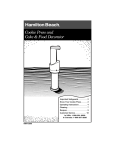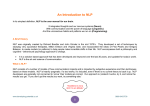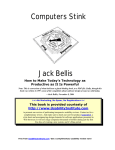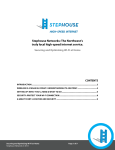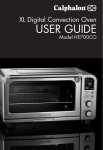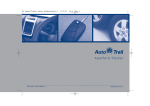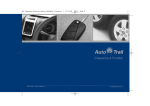Download LIFE ON THE ROAD - Frugal RV Travel
Transcript
LIFE ON THE ROAD A Virtual Seminar for RV Nomads Guidance From the Experts for: • Caravanners • Outback Travellers • Motorhomers • Campers • Grey Nomads • RV Tourists 9 Keynote Speakers More than 200 years of combined experience! Edited by Bill Revill This book is presented for informational purposes only. Although the content has been carefully checked for errors based on the editor’s many years of experience and research, the editor / publisher will not be held responsible or accountable for the use or misuse of the information contained herein. Life on the Road A Virtual Seminar for RV Nomads Compiled and Edited by Bill Revill Being a collection of selected quotations from the written work of some of the best-known RV nomads over the past 30 years. Please note: This e-book is not for individual sale and has been compiled purely for promotional use and in the interests of modern-day RV travellers wherever they may wander. Although quotations are made without specific permission, the editor trusts that the authors and / or holders of current, relevant copyrights will forgive such oversight and accept this collection in the mutually supportive spirit of ‘Freedom Road’. Some quotations have been subject to minor editorial change in the interests of brevity, or to render the text more appropriate to Australian readers. Seminar Program Topic Presenters Introduction Bill Revill 1 1. The Pros & Cons of Nomadic Lifestyles Harold Hough & Gordon & Janet Groene 2 2. Transport & Accommodation Choices Brian Sheedy & Bill & Jan Moeller 5 3. Preparation & Planning for Lifestyle Change Brian Sheedy & Bryce Fraser 7 4. Equipment & Hardware to Take on the Road Kay Peterson & Brian Sheedy 9 5. Packing & Loading: Your Mission Impossible Bryce Fraser & Gordon & Janet Groene 11 6. Travel Routines to Suit a Life on Wheels Brian Sheedy & Bill & Jan Moeller 13 7. Even Nomads Have to Eat! Bryce Fraser & Harold Hough 16 8. The Freedom of Bush Camping Joe & Kay Peterson & Harold Hough 18 9. Power & Energy Supplies Outback Bill & Jan Moeller & Joe & Kay & Peterson 20 10. Health is Still an Issue Bryce Fraser & Gordon & Janet Groene 22 11. Keeping Your Finances Afloat Kay Peterson & Bill & Jan Moeller 24 12. Personal affairs Harold Hough & Kay Peterson 27 Bibliography Page 29 Introduction ? Hold on a minute! What on earth is a ‘Virtual Seminar’ Well, it certainly is different. Here’s how we did it . . . As you can imagine, during 37 years of ‘hands-on’ involvement in remote, nomadic lifestyles – writing, researching, tutoring, and of course, wandering the backblocks living it – my wife, Jill, and I came across the writings and the wisdom of some of the most experienced ‘nomads’ the outdoor world has ever seen. In fact almost everything we have read has, in some small way, helped nurture and shape our own ‘gipsy’ lifestyle. Let’s face it, there’s no point any of us blundering along, making mistakes, when there’s an abundance of advice available that will show us where the rough spots are! Consequently – and based on our firm belief that anyone who yearns to follow that ‘Freedom Road’ can learn the necessary skills and techniques through that very same process – we started putting together a huge collection of ideas, tips and advice from those many dedicated, full-time wanderers who travelled that road before us. Pretty soon it became obvious that we had more than enough information to organise a ‘seminar’! That’s right: In their own words, all those experts are here, now, ready to show you how. Our Seminar Program (back on the previous page) gives you an idea of the wide range of topics these experienced travellers are presenting. Admittedly, not all of what you learn about here is going to suit your own particular travel plans and aspirations. Like most things in life, we all need to do it ‘our way’. However, by spending time with the ‘old hands’ you will, at the very least, shorten your learning curve. By the way, to find out who our assembled experts are – our Keynote Speakers – you’ll find a list of their names and some of their published work on page 29. But there’s more! That list does not include a number of well-known travellers and backcountry adventurers who have agreed to offer additional valuable advice by way of ‘cameo guest appearances’ at appropriate points during the presentations! So…you’re in pretty impressive company, whichever way you ‘listen’ to it! 1 OK. Enough of the chatter – Let the seminar begin . . . ____________________________________________________ Ladies and gentlemen, please make welcome our first speaker, all the way from the USA, author and long-time advocate of what he calls the ‘Freedom Road’ lifestyle, Mr. Harold Hough. By his own admission, Harold once had the big house, the two cars, and the high-status job, but he was also deep in debt. So, to get his life back together, he made a plan, paid off his debts, bought an RV and hit the road. Harold is going to open our seminar with his topic: ‘Why I Took Up the Freedom Road Lifestyle’. This will be immediately followed by the flip-side of the argument: ‘The Downside of Fulltiming’, to be presented by Gordon and Janet Groene, also from the USA, who for many years have lived aboard either their boat or their RV. TOPIC #1: THE PROS AND CONS OF NOMADIC LIFESTYLES PART 1: ‘Why I Took Up the Freedom Road Lifestyle’ -- Harold Hough “ • The early settlers were searching for freedom and the chance to make a new life for themselves. They wanted freedom from government, freedom from community standards, freedom from past mistakes, and, most of all, freedom to be judged for what they were. • Modern life is a package of everything that leads us to an early grave. By breaking away from the world, however, you can eliminate many of the problems that lead to illness in our society and live a better, healthier life on the road. • The wonderful tonic that has given us health and happiness can be found with a Recreational Vehicle (RV) and any open road. We left the stress of a regular life behind in the city and started living a simpler lifestyle where happiness is better than status and government is left for others to deal with. • A high degree of freedom can be reached by avoiding the chains of a fixed residence and by changing your attitudes. These, combined with knowledge, can give you the freedom, health, and security that only the richest men in the world could hope to emulate. 2 • We work at unpleasant tasks because we want to make more money. We spend too much money to advertise our wealth. We work ourselves into ill health to save for a retirement that is plagued by the ill health we contracted. Freedom comes from renouncing wealth and focusing on what our needs really are. • Why should people sacrifice for their whole life just to have a few years of happiness? The best life is one where each day is a joy and we aren’t deferring it for some unknown future. With the Freedom Road lifestyle, you’re living and enjoying each day. • Anyone who wants to divorce themselves from society must learn how to become happier without money. If you’re willing to sacrifice current pleasures and are willing to have limited material needs in the future, you can join the Freedom Road quickly. • For many it’s a reward for a life of conventional work, a retirement lifestyle that keeps both body and mind young. But, for some it’s not a compromise with modern society, but a declaration of independence from the world around them. They are the modern pioneers -- moving to new lands that promise a better and freer life. • Old age means a reduced earning level. But a Freedom Road lifestyle is so inexpensive that the average person can continue to live well on a small or nonexistent pension. By learning to keep costs low when we’re young, we learn how to be happy on less money and we avoid the shock of reduced income when we become older. • People are afraid of old age because they have little faith in their ability to cope. The Freedom Road lifestyle gives you many of the skills you can use to live a full life as you grow older. • Since RVs are smaller and designed to operate independently, they require less utilities and power than a conventional house. That means less monthly costs and less environmental impact. • You should save money for three things: an RV; to develop income potential; and emergencies. • Life on the road isn’t a trail of hardships. It’s a way to enjoy life to its fullest while avoiding the entanglements of our modern world. PART 2: ‘The Downside of Fulltiming’ -- Gordon and Janet Groene “ • To change lifestyles, no matter how flexible we consider ourselves, is a tough assignment. • The decision to put aside a conventional home and belongings to go on the road, and the way you deal with other people about that decision, is the first, ten-storey step. • The fulltime RV life is all you hope for, and much, much more. But it is also a break with treasured possessions, with status, with symbols, and with ‘Our Place in Life’. ” 3 • Like most people, we found it hard to give up the habits, possessions, and hard-won career of a lifetime. • In shedding our old style of life and adopting a new role as fulltime wanderers, we lost a lifelong mantle of respectability. We now lived a life that baffled or amused many of the home-dwellers we met, and enraged a few. • The RV alone is a red flag in the face of the good burghers of many cities, where special laws have been passed against RVs for no crime other than being RVs. Now there’s some excellent food for thought. Thanks guys. ” And here’s my two cents worth… For the ten years or more of our ‘apprenticeship’ we fell in love with the freedom, the closeness to nature, and the self-reliance that develops in remote, sometimes difficult terrain. Excerpt from ‘An Aussie Nomad’s Guide to Life on Wheels’ by Bill Revill (2007) (See page 29.) ___________________________________________________________________________ Excerpts under Topic #1 were taken from: • • ‘Freedom Road’ by Harold Hough, published by Loompanics Unlimited, USA (1991) ‘Living Aboard Your Recreational Vehicle’ by Gordon & Janet Groene, published by ICS Books, USA (1986) ___________________________________________________________________________ And now, to tell us something about the various options we have regarding nomadic transport and mobile accommodation, please allow me to introduce Australia’s very own Brian Sheedy. To support Brian in this topic, we have Bill and Jan Moeller from the U.S. who also have been fulltime RVers for more than 20 years, using their photojournalism skills to finance the lifestyle. 4 TOPIC #2: TRANSPORT AND ACCOMMODATION CHOICES Ladies and gentlemen: Brian Sheedy… “ • Above-the-line expenses are your day-to-day, on-road costs and are determined, in very large part, by your lifestyle-of-the-road decisions. The most obvious example of this is fuel consumption. The more comfortable and spacious you lifestyle, the bigger, heavier and more expensive it will be to move it around the country. A minimal set-up will cost half as much in fuel as a heavy one. It’s as simple as that. • At some time or other, everyone wants to or needs to get off the bitumen and that is where the strain on traveller and equipment shows if neither is prepared. Many cars and campervans, and most caravans, do not perform well on poor roads, a further reason why the twin questions of “where” and “how” have to be considered together. • There’s an awful contradiction: what’s best when you’re moving is never what’s best when you’re stopped, and vice versa. • Everything has to be that much better in a tow vehicle. It has to work much harder to get the rig rolling, to drag it over hills and rough surfaces and to stop it effectively. • Whatever your plans, most of your journey will be on the bitumen or on well-graded gravel where a conventional car has most of the advantages. • Provided there is a reasonable match between load, vehicle capability and routes taken, any car will do. • The element of risk is always there for any vehicle, old or new. The whole objective of the preparation stage is to minimise that risk. • Any major work must be completed in time for you to do a minimum of a thousand kilometers on it prior to D-day. Even the most minor jobs need sufficient time for incorrect settings, faulty parts or careless fitting to show up. • Even if you don’t understand much of the (service) manual, the routine tasks are easy to follow. The manual also makes it easier for anyone helping you. • Caravans suit the moochers and the dawdlers. These people willingly trade the mobility of a camper-trailer for the space and convenience of a caravan because it has to function as a home. They are experiencing a change of lifestyle, not having a holiday. They argue that they don’t lose anything in economy because their slow pace compensates for the extra drag. • The secret of carefree, or at least disaster-free, caravanning is to have the best possible towing system, to prepare well, stay within its limits and monitor it regularly and thoroughly. 5 • There is no all-seasons, all-roads, all-purpose “habitat” anymore than there is the perfect vehicle or the perfect sleeping bag. Your choice is always a compromise and therefore has limits. As long as you recognise these limits, stay within them most of the time and take the right precautions when you move outside them, any of the modes will work. Thank you Brian. There’s something there for all of us. ” OK, Bill and Jan Moeller, what would you like to add to Brian’s comments? “ • If you do not own an RV, a new one is not essential for fulltiming. An older RV can look much newer if three major changes are made: new carpet, new upholstery, and new window treatments. • We like as small a caravan as possible for a number of reasons: it doesn’t require as much fuel to haul it around as does a larger, hence heavier, caravan. It costs less to heat or cool it properly, housekeeping and cleaning don’t take much time, and a smaller caravan can be taken to more places because it’s easier to drive, park, and maneuver. • Natural ventilation is generally better in caravans than in motorhomes. Many caravans have opening windows on all four sides, an arrangement that admits a breeze no matter which direction it comes from. • On average, foot for foot, caravans have more living area and storage space, inside and out, than most motorhomes. • Undoubtedly, what puts off many people about caravans is the impression that hitching, unhitching, backing, and parking a caravan are mysterious, hard-to-learn procedures. They are not, of course. • Never feel guilty about taking up too much of a salesperson’s time. Ask everything you want to know about the unit you are considering. Making the right selection takes time, and should not be rushed under any circumstance. Thank you Jan, Bill and Brian. And here’s my two cents worth… If an RV (which I prefer to call a ‘residential vehicle’) is to be your home for some months, why not add a few personal, ‘homely’ touches – like a few mementoes, small wall-hangings, flowers, cushions, and so on. Provided you don’t get too carried away, the ‘comfy’ feel of your home on wheels helps adapt to the lifestyle during your early weeks on the road. Excerpt from ‘329 Hints, Tips and Money-Saving Ideas for RV Travellers’ by Bill Revill (2007) (See page 29.) 6 ” ________________________________________________________________________ Excerpts under Topic #2 taken from: • • ‘Outback on a Budget’ by Brian Sheedy, published by Roadwrite Australia (1987) ‘Complete Guide to Full-Time RVing: Life on the Open Road’ by Bill & Jan Moeller, published by Trailer Life Books, USA (1998) ________________________________________________________________________ Moving right along, our next topic concerns ‘Trip Planning’. Brian Sheedy has agreed to help out again on this one, followed by input from veteran Aussie, camper and RV traveller, Bryce Fraser, making this an allAussie topic! TOPIC #3: PREPARATION & PLANNING FOR LIFESTYLE CHANGE Over to you, Brian….. “ • The ‘touristy’ spots are only the tip of the iceberg. Beyond them, sometimes ‘just around the corner’, are magical places you have never heard of. The recent development of the road system and the rapid growth of the national parks have put dozens of these places within reach. • It is misleading to think that you will be happy to stick to the “main drag” and see the known sights. As you hear, along the way, of wonders you didn’t know existed, you will be increasingly tempted to wander into more difficult terrain. You will be increasingly frustrated if you feel you can’t. • That’s how the questions of “where-and-when” and “how-to” are tied together. The first of these you can change as you go but the other you are stuck with, so it needs a lot of thought. The best choice is the one that will give you the greatest pleasure travelling for the lowest outlay. • Which is more important: deciding where and when you will travel or deciding how you will travel? Neither decision can be made without regard to the other. Which one you put first will depend on the time you have to travel and the amount of money you have to set up. • They found that it was much harder to bush-camp along the more populated coast and, in common with many travellers, found the coast costly, cluttered and disappointing after the inland. 7 • It helps (to be a bit of a mechanic) but I’m not and neither is the vast majority of travellers. You don’t need to have mechanical skills, but you do need to be resourceful if you are going to take on some of the harder stretches. Thanks, Brian. ” Now let’s welcome Australian author and all-round nice guy, Bryce Fraser, to pick up on this topic…. “ • (In planning) I think you have to steer a middle course. Although they often get away with it, the unprepared get-up-and-goers can land in awful trouble; on the other hand, the obsessive planners are in danger of having a pretty restrictive, if not dull, time -and it’s odds on something will foul up. • Get a good quality map of Australia, and more detailed maps of the states and regions that interest you. • As a rule of thumb, think in terms of spending the summer in the southern half of Australia and winter in the north. From late November to late April, monsoonal conditions (“The Wet”) can be expected to affect coastal areas in an arc roughly from Mackay to Broome and for an indeterminate distance inland. Apart from the discomfort, there are limitations on movement. Creeks and rivers burst their banks, low country floods, roads, causeways and bridges are submerged. • While you can have superb days in the Centre during the winter months, June-July can be extremely cold once the sun goes down. The summer can be almost unbearably hot. Thank you, Gentlemen. Plenty to think about there. And here’s my two cents worth… Long before departure – months even years prior to day one – you should start learning to live a simpler, uncomplicated lifestyle: How to make do with less, and how to differentiate between true needs, wants and luxuries. After eight years fulltime, we are still fine-tuning our hardware – the learning goes on forever! Excerpt from ‘Zen and the Art of Bumming Around’ by Bill Revill (2007) (See page 29.) ________________________________________________________________________ Excerpts under Topic #3 taken from: • • ‘Outback on a Budget’ by Brian Sheedy, published by Roadwrite Australia (1987) ‘Camping and Caravanning in Comfort’ by Bryce Fraser, published by Margaret Gee Publishing, Australia (1993) ________________________________________________________________________ 8 ” Now we get down to the nitty gritty! Long-time RV traveller, Kay Peterson, from the US is going to open our next key topic: ‘Equipment and Hardware’, and she will be followed by Brian Sheedy with a bit more input from an Australian perspective. Kay Peterson and her husband Joe – we’ll hear from Joe a little later – hit the road back in 1970 to live the nomadic life in their 26-foot caravan. In fact, you may have heard of the Petersons: it was Kay and Joe who started the now very popular Escapees Club way back in 1978. TOPIC #4: EQUIPMENT & HARDWARE TO TAKE ON THE ROAD The floor is yours, Kay… “ • Our constant exposure to advertisements makes it hard to resist filling our home with gadgets. When we moved into an RV there was no room for all theses accumulations, and I suddenly realised we didn’t really need them. Yet we still have all the conveniences necessary to make life comfortable. • You may not realise how many possessions you have acquired over the years until you try to put them all into a small box on wheels. You are suddenly faced with traumatic decisions. • One of the hardest lessons for me to learn was that many of the can’t-live-without possessions that we have are not as important as we thought. • We established a rule that we wouldn’t take anything unless we expected to use it at least a couple of times a year. The fate of those items that we would seldom use was determined by three things: (1) weight of the object; (2) amount of space it takes up; and (3) difficulty in replacing it if we later find we do need it. • I also eliminated many of the assorted sizes of pots and pans and took only the few I used most often. With a small electric frying pan, this proved adequate. Thank you, Kay. ” Right, Brian, you’re on again…. “ • Acquire a stock of reliable, durable gear gradually. Don’t go on a shopping spree. • Having the right gear on the road is one of the keys to cheap travelling. A useful rule when in doubt is: “if it’s small and expensive take it, if it’s big and cheap leave it.” 9 • Keeping the load within the existing boundaries of your vehicle and trailer is a sound fuel -conservation practice. • Make a list of all the things you need, then cut it in half. Spread out those things that survive, have a good look at how hopeless it is, and throw half of them away. • Don’t leave without a little luxury or you’ll be miserable. You’ll certainly want to cook and eat in comfort and you have to sleep well. • The annexe is not well adapted for travelling. Makeshift flies or tarps are much more flexible in creating outdoor living areas. With cheap and durable (polyweave) material, aided by rope, string, sticks, tent pegs, trees, vans, and roof racks, people construct an endless range of outdoor environments to suit the conditions. • The only useful tool is the one you know how to use. With the aid of a service manual (of the Gregory’s sort) and some clear thinking you can teach yourself a lot, and there will be other travellers willing to (dying to) help. Sharing tools and knowledge and experience in motor-maintenance sessions is one of the quiet pleasures of leisurely travelling, but only if you are willing to admit your ignorance and to have a go. • Two good jacks (not one), and the wooden plates to go under them are a must, but I have never found the ideal ones. ” Folks….Let’s show our appreciation for Kay and Brian. And here’s my two cents worth… By learning the ‘Lost Art of Improvisation’ you can avoid the unnecessary purchase of some equipment and hardware whose end-use can be adequately achieved using some other item that you already have. Excerpt from ‘66 Ways to $ave Money on the Road’ by Bill Revill (2007) (See page 29.) ___________________________________________________________________________ Excerpts under Topic #4 taken from: • • ‘Home is Where You Park It’ by Kay Peterson, published by RoVers Publications, USA (1990) ‘Outback on a Budget’ by Brian Sheedy, published by Roadwrite Australia (1987) ___________________________________________________________________________ 10 Let’s move on to topic number five: ‘Packing and Loading’ for fulltime RV travels. And to introduce these mysteries, first we have Aussie bushman Bryce Fraser again, then we’ll let Gordon and Janet Groene add a few more of their valuable comments. TOPIC #5: PACKING AND LOADING: YOUR MISSION IMPOSSIBLE! Take it away, Bryce…. “ • Packing starts with deciding what you will pack things in. This invariably revolves around what you already own but it may be worthwhile getting special bags, knapsacks, or some other form of container. • I’ve set up the back of the 4WD with shelving and boxes so that major items we are repeatedly using are readily accessible. Items that we hope we won’t need, but when we do may need to get to quickly, are also ready to hand in the back of the wagon: rain gear, Wellington boots, first aid kit, jack, wheel brace, etc. • To minimise rattling and risk of breakage, we wrap bottles with bubble-plastic sheeting, line the bottom of crates with foam-plastic sheeting, and use plastic sponges as wedges. • Tinned foods and drinks and other weighty items should be stowed as low as possible. • These are the rules to follow with a roof rack: keep the weight down (carry heavy items at floor level in the vehicle or van) and keep the profile low. • I indulgently keep two camp chairs within easy reach for lunchtime stops. • It’s not a chore putting things back in their rightful place, it becomes automatic. Knowing what goes where when packing up halves loading time and makes life easy. Thanks very much, Bryce. So, Gordon and Janet….What would you like to add? “ • Your fulltiming life can’t get off the ground until you can part with all the pounds of impedimenta that clutters your home, and it will be difficult to stay on the road if you fill the RV with souvenirs and bric-a-brac. • Once you start moving aboard (the RV), be ruthless about what to keep and what to get rid of. Even if you manage to cram in the potato ricer or your custom bowling 11 ” ball, it will cost you fuel dollars to haul and brake every ounce. Clothing, books, hobby gear -- everything should be looked at with fresh, unprejudiced eyes. Still, you’ll take too much. We all do. • As you outfit your RV, remember that you’ll be on the road for many miles each year. Underway, everything must be very securely stowed so it can’t come loose and be smashed (or smash someone) in an abrupt stop. Fair comment. Thanks Gordon and Janet...and of course, Bryce. And here’s my two cents worth… Excessive or poorly distributed RV loads are the most frequent cause of towing problems. Keep all that gear down to necessities, then carefully distribute the load so that most weight is in the lower quarter of your van, with about a 60% bias over and forward of the axle. Avoid too much heavy gear either on the ‘A’ frame or the rear bumper (eg, jerry cans, extra LPG cylinders, tool boxes, etc.) As you travel, be prepared to experiment with load distribution if the van is prone to sway or ‘fish tailing’. It may involve several changes to get it right. Excerpt from ‘An Aussie Nomad’s Guide to Life on Wheels’ by Bill Revill (2007) (See page 29.) ___________________________________________________________________________ Excerpts under Topic #5 taken from: • • ‘Camping and Caravanning in Comfort’ by Bryce Fraser, published by Margaret Gee Publishing, Australia (1993) ‘Living Aboard Your Recreational Vehicle’ by Gordon & Janet Groene, published by ICS Books, USA (1986) ___________________________________________________________________________ OK. It’s time to take a look at your daily routines once out there on the road. And as you’ll soon learn, there’s a big difference between ‘holiday’ routines and routines that suit a ‘fulltime lifestyle’. Brian Sheedy has offered to kick this one off, and once again Brian will be joined by those 20-year veteran ‘roadies’, Bill & Jan Moeller to offer up a little more of their valuable experience. 12 ” TOPIC #6: TRAVEL ROUTINES TO SUIT A LIFE ON WHEELS Thank you once again, Brian… “ • “Do it up and put it back”. This is the single most important routine, and you learn very quickly to apply it to everything from the fuel cap to the honey jar. It is how you avoid uncertainty and how you are able to find things when you need them. • A lifestyle of “routine and vigilance” sounds suspiciously like a career in the Coastguard, but if you are one of those people who like routine, and find it easy to adopt new ones, you will adapt well to self-sufficient road travel. Most disasters, little or big, stem from either a lack of observation or failure to behave in your usual way: vigilance and routine. • Having two drivers, capable of handling your on-road outfit in any circumstances, does more than just reduce the day-to-day pressure on a sole driver. Minor injury -- a sprained wrist, for example -- can upset your plans if is being carried by the only person who can reverse the caravan or, worse, drive at all. • Recognising that needs change is important in all areas. Never lock yourself into a style, or depend on a way of doing things that you can’t change easily and cheaply. • Routine is most important at pack-up and departure times. It is important to ensure systematic packing so that things are in the right places later, and that nothing is left behind. Routine is important for safety as well. • Stops have to be given as much time as they need. Don’t limit them like the office teabreak. Isn’t that what we are trying to get away from? • The continual round of checking, tightening, repairing and servicing even the littlest things, was compared by one traveller to solo yachting -- when people ask you what you do all day, you tell them you just keep the thing afloat and going roughly in the right direction. • The pace at which you travel determines the ease with which you travel. A weekly average of 500-600 km is fairly comfortable, and less than 500 km is leisurely. • The real determinants of tyre survival are speed and load. • The slow traveller does not invite failure by pushing humans or machines too far, too fast. Slow travellers don’t even have tyre trouble! Slow travellers have the time to find the great spots off the track and to take the long detour to the magic places the fast traveller never sees. They have time to find the local orchard and market garden, to stop at roadside stalls and to shop around in town for the specials. They even have time to catch a few fish and make their own bread. 13 • Those who read the conditions properly, who check the danger points like the doors and interior fittings regularly, who are prepared to redistribute their load to suit the conditions, who empty the water tanks, who adjust tyre pressures and who generally monitor their equipment, may be the last into the Rest Area but they are usually the first to leave. • To survive the “first day horrors”, decide that you will leave home when you are ready, not “on the dot of six” or “straight after breakfast” and that you will stop for a snack, of your own making, after one hour. Also, decide on a destination not more than three hours travelling time from home. Pick somewhere that has some appeal, and decide that you will see or do something there that day. Make a pact with your fellow travellers that if it is freezing cold or pouring rain you will treat yourselves to a motel and a good feed. If it turns out that the spot is excellent, the weather great, and everyone loves it, stay. Get the essential few days rest in right there. Get used to your gear and the space limitations and the million other things that are new and strange about “road life”. This is not a trip where time is of the essence, it is about enjoyment, and this investment of a couple of days at the beginning will return handsome dividends in the weeks to come. • Two processes -- getting rid of your outrage at the cruel hand that fate has dealt you, and restoring your mind and body to normal -- are the most important factors in dealing with an emergency. What you need is a nice cup of tea. Whether the tea helps or not is irrelevant, it is the time taken, and the therapy of doing something you understand, that makes the difference. • You will pick up information about places all the time, provided you are going slowly enough to tap the ‘grapevine’ of the road. The grapevine not only knows all but it also tells it freely. You, in turn, have to be flexible enough to take up new options as they arise. • You will push the boundaries back little by little, learning more and more each day about your capabilities and the capabilities of your equipment. In the end, the biggest surprise of all will be how easy it was. Well, Bill and Jan, Brian is always a hard act to follow, but let’s hear what you’d like to add… “ • In a small environment, little annoyances have a way of festering into major irritations. • It’s risky to venture into fulltiming if you have had no RV experience at all. Having to learn about RVs at the same time you are learning about fulltiming could be exasperating and discouraging. • Make frequent stops for driver relaxation, for the tyres to cool down, and to do a quick walkaround of the rig to see that everything is in order. • Since many fulltimers spend a fair amount of their time driving, the driver-passenger area, or the cockpit, should be outfitted to make it efficient and comfortable. You’ll want certain items near at hand, such as maps, directories, fuel and service records, trip log, beverage holders, and a litterbag. 14 ” • The hazards of too-rigid pre-planning are many. A schedule may be upset by traffic jams, bad weather, or detours. When a delay occurs, most schedule-makers feel they have to make up the time they have lost. Those that set schedules aren’t in the best humour when they can’t keep to the schedule. • When driving, check all gauges frequently to catch developing problems before they become serious or cause damage. Thanks, guys. Lots of very sound advice for all of us there. How about a round of applause, folks! ” And here’s my two cents worth… Each roadsign carries an implied interpretation that motorists must (in many cases) adhere to, or at least (in other cases) be mindful of. Signs warn, they prescribe, they advise and they recommend -- every one of them having its own ‘standard message’ that failure to interpret and/or follow can result in fines, accidents, geographic embarrassment, or simply missed opportunities. Whether you happen to be holidaymaker or nomadic lifestyler! However, backcountry nomads -- fulltime travellers of our highways, roads and tracks -- must also read ‘between the lines’ of each message so as to optimize the opportunities hidden within each scenario. Excerpt from ‘What Does it All Mean? A Grey Nomads Interpretation of Roadsigns’ by Bill Revill (2007) (See page 29.) ___________________________________________________________________________ Excerpts under Topic #6 taken from: • • ‘Outback on a Budget’ by Brian Sheedy, published by Roadwrite Australia (1987) ‘Complete Guide to Full-Time RVing: Life on the Open Road’ by Bill & Jan Moeller, published by Trailer Life Books, USA (1998) ___________________________________________________________________________ Now, here’s a subject dear to my heart: Eating! Mind you, I’m sure our speaker won’t offer too much argument there, either. Ladies and gentlemen, this session is, initially, in the very capable hands of Aussie Bryce Fraser, who will then hand over to Harold Hough to provide a bit of U.S. perspective on what has to be a very popular topic… 15 TOPIC #7: EVEN NOMADS HAVE TO EAT! Tell us all about it, Bryce… “ • All meats should be wrapped in aluminium foil rather than in plastic, which causes sweating. • Factors influencing you’re your use of prepared foods will be the availability of freshfood shops, your personal taste, lightness, bulk and cost. • Provided you enjoy eating them, pasta and rice are essential items in the camper and caravanner’s food box. Pasta can be a meal in itself or, like rice, can be a splendid accompaniment to a meal. The two-minute noodles are also a boon. Stews or hot pots in their various guises -- goulash, Irish stew, curries, braised steak, ragout, etc. -- can be delicious alternatives to barbecues. They’re easy to make, either in a pressure cooker on the stove, or glugging away in a camp oven over a low fire. • • The amount of food you pack to take with you depends on how far you will be from shops of any kind. But if you know you won’t have access to shops for, say, a week, the only logical way to determine how much to take is to plan your daily menus. • Then there are multi-purpose baking mixes that not only make an admirable damper, but can be used for whipping up a number of good things such as pizzas, quiches, shortcakes, scones, pikelets, and crepes. It’s simply a matter of which ingredients you add -- milk, water, eggs or sugar -- and how much. • There is no need to take your entire pantry, but a few carefully selected bottles and jars can add enormously to the enjoyment of eating. You can now buy a whole range of sauces in which any type of meat can be cooked, and a dash of this or that can transform something very ordinary into an extremely tasty dish. The point is, you know what you like. If something can make or add to the enjoyment of your meals pop it in -- we’re talking about the space taken by a smallish cardboard carton or plastic box. • We always carry spare rations, the amount depending on where we are. A few tins and packets take little space and enable us to stay on longer if we find an appealing campsite. In isolated areas, it is wise to carry emergency rations for at least a week -and an adequate supply of water. OK, Harold, let’s hear a bit more from the Yankee perspective… “ • One key to eating inexpensively is to develop your own recipes. As you spend more time cooking and learn which ingredients work for you, you can start developing your own favourites. 16 ” • The Freedom Road lifestyle fits perfectly with cheaper and better eating. Since money isn’t your god, you have the time to fix enjoyable meals in your RV. • Treat yourself to a really good meal once a week. Use one of your cookbook recipes, and next time you go to the store, buy the ingredients. Take the time to prepare it and spend time enjoying it. Thanks a lot, Harold. And thank you again, Bryce. And here’s my two cents worth… After some trial and usually lots of error, campfire cooking becomes one of the essential pleasures of any type of outdoor lifestyle. Trying new recipes and equipment, looking for new ideas, and getting the group involved are all part of the fun. And once you’ve settled on a personal grab-bag of cooking methods and favourite recipes, it’s possible for bush meals to be as good, if not better, than in your RV galley -- or, indeed, your kitchen back there in the world! Excerpt from ‘Campfires & Campfire Cooking for Campers and RV Travellers’ By Bill Revill (2007) (See page 29.) ___________________________________________________________________________ Excerpts under Topic #7 taken from: • ‘Camping and Caravanning in Comfort’ by Bryce Fraser, published by Margaret Gee Publishing, Australia (1993) • ‘Freedom Road’ by Harold Hough, published by Loompanics Unlimited, USA (1991) ___________________________________________________________________________ Well, folks, by the way you’ve all been frantically taking notes, it sure looks like these guys are throwing a lot of red-hot advice your way on the subject of ‘Freedom Road’. Which is a great lead-in to our next topic: ‘The Freedom of Bush Camping’. As you know, this is also referred to as ‘coyote camping’, ‘camping without hookups’, ‘dry camping’, or making use of ‘freebies’. But whatever you call it, fulltimers with the depth of experience that Joe and Kay Peterson have are bound to have a lot of good input for us here today. They’re up next, followed by ‘Mr. Freedom Road’ himself, Harold Hough. 17 ” TOPIC #8: THE FREEDOM OF BUSH CAMPING Let’s welcome back Joe and Kay Peterson… “ • Our method is to start looking for a place to spend the night about an hour before we are ready to stop. This way we don’t have to take the first place we see. If we see an ideal place, we may stop earlier. • Start by looking for places where you could park overnight if you wanted to use them. You may be amazed at how many possibilities you see. The next step is to spend the night at one of them. Once you try it, you may find using freebies is not only easy, but fun, too. • The more common practice, and the one we recommend for those of you who are not on rigid budgets, is to stop overnight in a commercial campground once or twice a week. • From pioneers to present-day RVers, “bush camping” has been synonymous with “freedom”: - Freedom from having to decide in the morning where you will spend that night because you must make a reservation. - Freedom from having to back into tight places and unhitch. - Freedom from hookups that tie most RVers to established campgrounds. - Freedom to park where you want without worrying about security. - Freedom from having to leave because someone else has set your checkout time. • We treat each place we park as if it were our own yard and we try to leave each one in better condition than we found it. Picking up trash is welcome exercise after a long drive, and we feel it is a way of paying for the use of the property. As usual, excellent input from the Petersons. Well, come on Harold, let’s see what you can tell us about ‘freebies’…. “ • Any “permanent” location must be able to meet three criteria. The first and most important is legitimacy. It must appear that you belong (eg, a weekend vacationer) or inevitably the (authorities) will remove you. The second factor is accessibility to the outside. If you need to shop each week, you better think about staying near a town. Any long-term parking must allow you to live a comfortable life without much effort. The final criterion is the level of government authority evident or how often the area is patrolled. If you intend to stay on government land without permission, you should find a place where patrols are rare. 18 ” • If you intend to stay on (public) land, you should be prepared to keep quiet and appear to be a vacationer. • If you scout around, you can find a deserted road into a remote area where you won’t be bothered for a while. • The search for the ideal place has been my Holy Grail, but I’ve never found it. Ideal climates attract too many people and result in big government. • There is never a guarantee that any ideal place will exist for long. Definitely a topic worth following up on. Thanks a lot, guys. And here’s my two cents worth… To take maximum advantage of good campsites that you may happen across at any time, keep food, water and LPG supplies topped up. That way you won’t need to continue on to the next town to buy what you need, then back-track to your chosen site. Excerpt from ‘329 Hints, Tips and Money-Saving Ideas for RV Travellers’ by Bill Revill (2007) (See page 29.) ___________________________________________________________________________ Excerpts under Topic #8 taken from: • ‘Survival of the Snowbirds’ by Joe & Kay Peterson, published by RoVers Publications, USA (1991) • ‘Freedom Road’ by Harold Hough, published by Loompanics Unlimited, USA (1991) ___________________________________________________________________________ We switch across now to another topic of keen interest to all long-term travellers: How to keep up with power and energy needs out in the boonies. Bill and Jan Moeller will step up to the plate first on this one, followed by another of our U.S. family duos, Joe and Kay Peterson. 19 ” TOPIC #9: POWER AND ENERGY SUPPLIES OUTBACK Ladies and gentlemen, here again are Mr. And Mrs. Moeller… “ • A fully charged battery at rest (with no load on it) should have a reading of 12.7 volts, and a discharged battery, 11.8 volts. You’ll notice the difference between being fully charged and discharged is not much -- only 0.9 volt. (A battery discharged by 50 percent will read 12.3 volts, a drop of only 0.4 volt.) • As a battery is discharged, the voltage decreases. When the voltage drops to 11.8 volts, much electrical equipment will cease to operate. Many batteries, when discharged to below 50 percent of capacity, reach this voltage. To be on the safe side, batteries should be discharged no more than 50 percent of their rated capacity. • As long as house batteries can be kept charged, fulltimers are free to go anywhere they want and enjoy all the comforts and conveniences of home without having to depend on an electrical hookup. • For more accuracy when reading battery voltage, always read the voltage after the battery has rested for at least fifteen minutes with no discharge or charge applied. • Ideally, all batteries in a bank should be of the same size and age and from the same manufacturer. • The refrigerator functions better in hot weather if the RV is parked so that the side of the refrigerator is shaded or away from the full intensity of the sun. • Those who bush camp need an accurate method of checking the state of charge in the batteries, and in any camping situation a way of monitoring and checking out the electrical systems is useful. This can be done with simple multimeters, sophisticated panel meters, and monitor panels. • To purchase a proper ‘house’ battery, some indication of the amp-hour (Ah) rating or the reserve capacity is needed. Each house battery in a two-battery bank should have a reserve capacity of at least 120 to 130 minutes, or 75 amp-hours. • When selecting solar panels, a good rule of thumb is to figure one 48 watt panel for each 105 amp-hours in the system, or one watt of panel output for every two amphours of battery capacity. ” OK, now it’s back to Joe and Kay. What have you got for us, guys? “ • No inverter is the answer to all the electrical needs of the bush camper. Keep in mind the amount of draw from the battery when you are using an inverter: for every amp you use at 240-volts, you take more than 20 amps out of the battery. Conservation remains the prime rule for using your self-containment. 20 • Once you have a couple of extra batteries, the next important piece of equipment is a power inverter that changes low voltage DC to 240-volt AC, giving you the convenience of commercial power without hookups. It provides an alternative to running a generator or making do with the limited appliances that are available in 12-volt versions. • What you need is a battery that will provide the power you require without being cycled (depleted) by more than 25% before being recharged. If you have a 100 amp hour (AH) battery and you use no more than 25 or so AH before recharging, the battery will probably last longer than you will. Simple arithmetic -- how many AH used versus how many available -- will tell you how many batteries you need. • When you use a generator, you need to plan ahead so as to coordinate your activities. Then when you turn the generator on to recharge batteries, you can take care of your electrical needs (at the same time). That way you are able to fully utilise the fuel it takes to run it. • With a combination of batteries and solar panels you can have your own portable power plant that allows you to produce electricity from the sun. This is especially popular with today’s bush camper because there is no pollution involved and there is no cost once you have made the initial purchase. Now there’s another load of excellent advice for us. Folks, let’s hear it for the Moellers and the Petersons. And here’s my two cents worth… One very workable set-up for unpowered campsites is to install dual-batteries in the car (ie, a heavy-duty ignition battery, and a deep-cycle accessory battery), plus one or two additional deep-cycle ‘house’ batteries (say, 100 amp-hours each), mounted in an externally accessible compartment in the caravan or motorhome. House batteries can be charged from an appropriately sized vehicle alternator (also wired back to the van), but a much better arrangement is to have house batteries trickle charging from solar panels on the RV roof. Excerpt from ‘329 Hints, Tips and Money-Saving Ideas for RV Travellers’ by Bill Revill (2007) (See page 29.) __________________________________________________________________________ Excerpts under Topic #9 taken from: • ‘Complete Guide to Full-Time RVing: Life on the Open Road’ by Bill & Jan Moeller, published by Trailer Life Books, USA (1998) • ‘Survival of the Snowbirds’ by Joe & Kay Peterson, published by RoVers Publications, USA (1991) ___________________________________________________________________________ 21 ” Moving right along, our next topic is, of course, one that never seems to go away. Particularly for us…um…old timers! No matter how much fun we have out there on the road, we still need to watch our health. That being the case, Bryce Fraser has agreed to open this topic for us, followed by a little more of Gordon and Janet Groene’s gold-plated advice. TOPIC #10: HEALTH IS STILL AN ISSUE The floor is yours, Bryce… “ • “Bird baths” are quite satisfactory, the routine being to use a flannel to distribute water over the body, after which you soap up, then wash down with the flannel. • Food covers like little square net umbrellas that my mother used can still be bought in camping and variety stores. • Portable chemical toilets are well-designed, light, compact and simple to use. They are the solution for those who are uneasy about squatting in the bush. Waste is neatly disposed of by pouring the contents into a prepared pit a suitable distance from the campsite and well away from areas that others might use. The waste should be covered each time with a layer of soil from the pit. • Something that many people gloss over is their ability to take effective measures in the event of accident or illness. A well-equipped first aid kit is essential. Just as important is to know how to use it. And don’t forget pharmaceutical items likely to be needed by each member of the party. • Unless there are garbage bins at the site, the rule is: “What you bring, you take away.” The exceptions are paper packaging, peelings and food scraps which can be thoroughly burned. Cans also can be burned to remove any residue, then flattened and put in a plastic garbage bag to be taken with you when you leave. • When irritating little bush flies pester your face and ears it’s hard to beat a net that covers your hat and extends below your neck. Thanks, Bryce. I’ll now ask Gordon & Janet to take the stage… “ • ” Before you part company with your hometown doctor, take care of any elective surgery you need and get it over with. Have a check-up, get new glasses, have your teeth cleaned and checked, and get a supply of all the medications you take. It’s also a good idea to get spare eyeglasses or contact lens. 22 • Preventative medicine, good (health) insurance, sound nutrition, weight loss, wearing seat belts, and kicking the tobacco habit are at the core of you healthful fulltiming years. So is exercise. • The more complicated your medical affairs, the more you should know about your case to tell doctors you deal with in your roamings. ” Terrific. A big ‘thank you’ to all three of you. And here’s my two cents worth… Health is largely a D.I.Y. exercise. It is, therefore, our own responsibility. After all, unless you actually need constant professional care, rarely is there any reason to avoid a ‘bumming around’ lifestyle. Once again, it gets down to preparation and planning, so providing you allow sufficient time, most circumstances can be overcome or worked around. Even in extreme cases, RV modifications and/or specialised equipment allow many physically challenged people to stay on the road for extended periods. Excerpt from ‘Zen and the Art of Bumming Around’ by Bill Revill (2007) (See page 29.) ___________________________________________________________________________ Excerpts under Topic #10 taken from: • ‘Camping and Caravanning in Comfort’ by Bryce Fraser, published by Margaret Gee Publishing, Australia (1993) • ‘Living Aboard Your Recreational Vehicle’ by Gordon & Janet Groene, published by ICS Books, USA (1986) ___________________________________________________________________________ Now we don’t want anyone to start getting second thoughts about a life on Freedom Road, but at some stage prior to departure we all have to take a long hard look at our financial affairs. So, as you might expect, Kay Peterson has some excellent tips for us in that regard, and she will be followed by a -- pardon the pun! -- wealth of information from Bill and Jan Moeller. 23 TOPIC #11: KEEPING YOUR FINANCES AFLOAT Over to you, Kay… “ • Budgets consist of two major categories: the necessities (vehicle registration, insurance) over which you have no control, and the controllables. Many items (such as food, fuel and park fees) may seem like necessities, but they actually are controllable. • Couples living in RVs can get by on a lower income than the average, and if there are no jobs in an area, the RVer moves his home somewhere else. • Fulltimers, whether they are retired or earning their way as they go, know that if they overspend in one area their period of travel will be cut short. Therefore, they are constantly looking for ways to save money. Taking advantage of free overnight parking is one of the most popular ways to do this. • Gasoline and parking fees -- your two biggest expenses -- will be determined by whether you travel short distances and stay for long periods in free and inexpensive places, or if you drive long distances and stay for short periods in luxury parks at premium rates. • How much does it cost to live in an RV and travel? It depends on how you want to live. Before you can determine how much it will cost you, you much decide at what level you want to live. • It can be advantageous for the fulltime RVer to work through one of the national (employment) agencies because your records are transferable to their other offices across the country. • It is easy to turn hobbies into profit-making businesses. Those hobbies that seem to adapt best to this are those crafts in the jewelry, leather, and arts fields. One safe outlet for handcrafts is the local flea market. You can set up a portable table or spread a blanket on the ground to display your products. Since many of the sellers return weekly with the same products, local residents are prone to buy things that are different or unusual. • Keep careful track of every penny you spend for the first few months. If there is a hole in your pocket, you must find out where it is before you can mend it. • Lack of space helps cut down on impulse buying. We save a great deal on clothes (for example) because of the limited closet space. Which (in turn) forces us to have a smaller and more versatile wardrobe. • No problem is as difficult when your home is with you. We have had our share of breakdowns, and even though they are annoying and financially troublesome, somehow they seen less disastrous because we can relax inside our own home while the trouble is being remedied. 24 • The reality of economic problems exists whether you live in a conventional house or in an RV home. But however many dollars there are, they will stretch further if you live in an RV. • To be a successful working nomad you must have certain basic attitudes. You have to be the type of person who finds security in your own abilities and talents, and you must be able to sell those abilities to each new employer. In order to do that, you must truly believe in yourself. You must be a person who enjoys challenges and isn’t afraid to take chances. It takes more than just a love of travel to make a working nomad; it takes the ability to see opportunities and the willingness to try new things. Wow! Plenty of top-shelf advice for us there. I hope you’re all taking lots of notes because Bill and Jan now have some excellent advice for us on this topic also. Thanks, Bill, Jan…. “ • Being a do-it-yourselfer for maintenance and repairs helps in holding down expenses. • Don’t hide your skills or your desire to work. It’s important to let others know what you can, and are willing, to do. If you want a job, let people know because, if you expect to earn any money, it will be up to you to make the first move. • Fuel costs are affected by many variables: driving habits, the condition of the vehicle’s engine, whether it’s maintained properly, the weather and areas in which the vehicle is driven, and the size and loaded weight of the rig. • Generally, campgrounds in and around cities and large metropolitan areas are the most expensive as well as being the most crowded. And RV parks in popular vacation areas and resort localities may be much more expensive than a campground in a less popular area. • If we have any major repair work done, we try to stay in the area long enough to be sure everything that was fixed is working properly. • Inquire about weekly rates even if you plan to stay in a campground for as little as four days, and check the monthly rate if you’ll be staying only two weeks. • One important thing to remember, once you start fulltiming, is that it will be your everyday way of life. You won’t be on vacation -- even though it may seem like it -so, chances are, your budget won’t stand the strain of spending money for extras and luxuries. Most of us have to be careful not to spend too many of our hard-earned dollars on vacation-type frivolities. • The highest campground rates are found in resort towns, vacation areas, and at RV parks in and around large cities. Rates are higher in campgrounds with such amenities as swimming pools, saunas, tennis courts, and golf courses. 25 ” • The rates for camping in national parks have gone up like campground rates everywhere. In some, the rates almost equal the rates in private campgrounds with full hookups. If that doesn’t make you plan a little more thoroughly, nothing will! Excellent material….Folks, lets show our appreciation to Kay, Bill, and Jan in the usual way. And here’s my two cents worth… Essentially, the most frugal approach involves the adoption of a ‘gypsy’ style of travel, ie, by remaining largely independent of costly commercial facilities – while at the same time carrying most of what you need to stay safe, happy and mobile – overall cost can be reduced by more than thirty percent! Not only that, you’ll enjoy a bonus or two: most crowds are avoided, and new, largely unspoiled regions are yours to explore. Perhaps more importantly, you stand to gain a renewed sense of self-reliance. Excerpt from ‘An Aussie Nomad’s Guide to Life on Wheels’ by Bill Revill (2007) (See page 29.) __________________________________________________________________________ Excerpts under Topic #11 taken from: • ‘Home is Where You Park It’ by Kay Peterson, published by RoVers Publications, USA (1990) • ‘Complete Guide to Full-Time RVing: Life on the Open Road’ by Bill & Jan Moeller, published by Trailer Life Books, USA (1998) ___________________________________________________________________________ Well, last -- but certainly not ‘least’ -- is the subject of keeping our personal lives from falling apart behind us! Certainly, this is very much an individual matter, but Harold Hough joins us again to share some of his thoughts, followed by Kay Peterson for one last time. 26 ” TOPIC #12: PERSONAL AFFAIRS So…What do you suggest, Harold… “ • Letters don’t take long to write and a poorly written letter is better than no letter at all. Consequently, stay in contact with friends. You may have the opportunity to get together at a future date. • Freedom alone isn’t enough. You must have relationships with others that make the freedom worthwhile. Fortunately, the Freedom Road lifestyle allows you more time to develop and nurture your relationships and remove much of the stress that often tears people apart. • If the travelling life is starting to wear you down, stop at an RV park for a few months. You can re-establish connections with the rest of the world, find a job, and even save some money. After a few months you will probably realise why you started travelling in the first place and take off again. • Travelling every day may seem romantic at first, but inevitably the costs and the hassles will force you to spend more time at one place. The best idea is to keep travelling until you find a place you want to stay. ” Definitely food for thought. Kay, what would you like to add… “ • One way to meet people and make new friends is to join a club. If you already belong to one of the organizations that have national affiliations (eg., Lions, RSL, Rotary), you are welcome to attend functions in the areas you travel through. Retired nomads often make a point of going to senior citizens clubs in the towns they visit. • People are enthusiastic about handling your mail when you first start on your new adventure. However, it slowly changes into a chore to be performed no matter how busy the forwarder is. With a mail forwarding service, your mail is in the hands of professionals who also know exactly how to forward books, packages, and certified letters. Your mail never has to wait because someone is busy or sick or on vacation. • The nomadic life is certain to be a lonely one if all of it is spent among strangers. You must learn how to make new friends along the way. • When you move frequently, you need a permanent address for such things as bank statements, bills, insurance premiums, and registration renewals. 27 • Who knows what exciting friendships and adventures in living still lie ahead for each of us. They do not come knocking on doors. They do not come parading through (caravan) parks. We must make the effort to find them ourselves. ‘Amen’ to that. Thank you very much Kay, and you too, Harold. ” And here’s my two cents worth… The life of a nomad can be as simple (and cheap) or as complex (and expensive) as you choose. There certainly is no ‘right’ or ‘wrong’ way to do it, nor is there any ‘normal’ or ‘weird’ way. All there can ever be is ‘your’ way! Excerpt from ‘Zen and the Art of Bumming Around’ by Bill Revill (2007) (See page 29.) ___________________________________________________________________________ Excerpts under Topic #12 taken from: • ‘Freedom Road’ by Harold Hough, published by Loompanics Unlimited, USA (1991) • ‘Home is Where You Park It’ by Kay Peterson, published by RoVers Publications, USA (1990) ___________________________________________________________________________ Well, that’s it Ladies and Gentlemen. Thank you very much for your participation. Would you please join me in a big round of applause for all the excellent speakers who have come in from Freedom Road for the day so that our own RV lifestyles can be made a little bit easier, a lot safer, and much more enjoyable. Ladies and gentlemen…let’s hear it for the Experts… 28 Bibliography [Availability indicated is at time of publishing.] Material used in this seminar was quoted from: Fraser, Bryce: ‘Camping and Caravanning in Comfort’ (Margaret Gee Publishing, Australia, 1993) Current availability: http://www.biblioz.com Groene, Gordon & Janet: ‘Living Aboard Your Recreational Vehicle’ (ICS Books, USA, 1986) Current availability: http://www.amazon.com Hough, Harold: ‘Freedom Road’ (Loompanics Unlimited, USA, 1991) Current availability: http://www.amazon.com Moeller, Bill & Jan: ‘Complete Guide to Full-Time RVing’ (Trailer Life Books, USA, 1998) Current availability: http://rvbookstore.com Peterson, Joe & Kay: ‘Survival of the Snowbirds’ (RoVers Publications, USA, 1991) Current availability: http://rvbookstore.com Peterson, Kay: ‘Home is Where You Park It’ (RoVers Publications, USA, 1990) Current availability: http://www.amazon.com Revill, Bill: Various ebooks related to RV lifestyles and related outdoor activities: Current catalogue: http://www.authorsden.com/adstorage/61102/EbookCatalogue2009.pdf Or contact: [email protected] Sheedy, Brian: ‘Outback on a Budget’ (Roadwrite, Australia, 1987) Current availability: http://stores.ebay.com.au (BARRIE’S BOOKSHOP) Other titles accessed during research: Absalom, Jack: ‘Safe Outback Travel’ (The Five Mile Press, Australia, 1983) Current availability: http://www.adelaidebooksellers.com.au Barre, Harold: ‘Managing 12 Volts’ (Summer Breeze Publishing, USA, 1997) Current availability: http://www.atlasbooks.com Evangelista, Anita: ‘How to Live Without Electricity - And Like It’ (Breakout Publications, USA, 1997) Current availability: http://www.amazon.com Kirkby, Noel & Barbara: ‘RVers’ Guide to Solar Battery Charging’ (Aatec Publications, USA, 1993) Current availability: http://rvbookstore.com Ryan, Adrian: ‘Australian Caravan Touring Manual’ (Parts 1 & 2) (Australian Caravan Touring, 2002) Current availability: http://www.adrianryan.net/ Smith, Keith & Irene: ‘Hard Times Handbook’ (Thomas Nelson Australia, 1984) Current availability: http://www.rosygarden.com.au 29

































